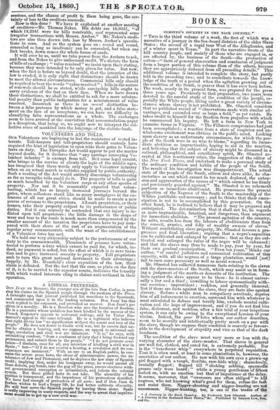VOLUNTEERS AND TOLLS.
OUR Volunteers are beginning to feel the resistance of vested in- terests. Toll-keepers and toll-proprietors should scarcely have required the hint of legislation to, open wide their gates to Volun- teers on duty. The Turnpike Act would appear to put the matter beyond doubt, for it declares that "any carriage conveying Vo- lunteer infantry" is exempt from toll. But some legal casuist, who brings to the service of clients the logic of the middle ages, has imagined that these words only apply to Volunteer infantry when on an actual march in vehicles supplied by public authority. Such a reading of the Act would entirely discourage volunteering so far as turnpike tolls could do it. The property of tolls is quite as much benefited by the Volunteer corps as any other species of property. Nor can it be reasonably expected that volun- teering, which has so largely increased journeys beyond the gates, where collectors stand like so many mortgagees at the en- trances of all our great cities, should be made to create a new source of revenue to the proprietors. All such proprietors, or their lessees, take their property subject to its performance of public duties. But it can scarcely be contended that any injury is in- flicted upon toll proprietors ; the little damage in the shape of wear and tear to the roads is much more than compensated by the smaller amount of the taxation the proprietors have to pay com- pared with their share of the cost of an augmentation of the regular army commensurate with the want of the establishment of a Volunteer force has met.
We hold our very citizenship subject to the performance of our duty to the commonwealth. Thousands of persons have volun- teered to perform a duty which cannot be paid for, for which, in- deed, no payment is asked, but the effect of which is to save taxa- tion and to give increased security to property. Toll proprietors seek to turn this great national movement to their advantage ; happily, by Mr. Mansfield's clear exposition of the law, their claim is defeated. But the fact that the case, so plain on the face of it, is to be carried to the superior courts, indicates the tenacity with which vested interests cling to claims anti-national in their operation.


























 Previous page
Previous page